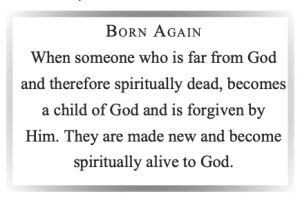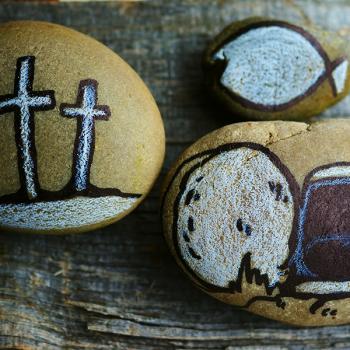A popular old Indian hymn, which has also been adapted and set to modern music, declares:
I have decided to follow Jesus
No turning back, no turning back.
The cross before me, the world behind me No turning back, no turning back.
These words were originally spoken by the first Christian from a remote village in India. They were his reply when he was asked to deny his faith or else be executed with his whole family. His heartfelt conviction impressed his murderers so much that, despite carrying out their threat, they later converted, along with the whole village.

We hope that by the time you finish reading this book you also will be able to truthfully sing those words, if you can’t already.
But before we explore what it means to follow Jesus Christ, we must begin by taking a closer look at who He is.
Why is it that so many people all over the world worship Him 2000 years after He was executed by crucifixion?
Jesus Christ was a carpenter from a rural village who claimed to be the Son of God. Christianity, which takes its name from Him, grew faster and remains larger than any other religion. Today 2.2 billion people describe themselves as Christians.
Let’s just say that if Jesus were on Twitter, He would have a lot of followers!
Download the PDF
Watch the message
Many people have all kinds of wrong ideas about Jesus. Some think that they cannot come to Jesus because they have said or done things that they know are wrong. They wonder, “How does Jesus feel about me, knowing what I have done?”
Most of us have a secret sense of guilt, and a fear of being “found out.” Perhaps it is things we have done that we regret; actions we have carried out that have wounded other people; or decisions we have made that haunt us.
 Other people like to think of themselves as respectable and essentially perfect. They think they are too good to need Jesus.
Other people like to think of themselves as respectable and essentially perfect. They think they are too good to need Jesus.
The truth is most of us think of ourselves in both of these ways at different times. No one is perfect; we are all in the same situation.
Later in this chapter we are going to look at an encounter in the Bible that shows how Jesus sees both these kinds of people.
Many outwardly successful people hide their quiet desperation. They feel inadequate, living without any real hope, joy, peace, or purpose. Some people feel like they are a total failure. Millions of people have found that Jesus is the answer to these feelings and restores our hope.
God is righteous and holy, which means He is perfect and completely separate from all wrongdoing. This causes a barrier between God and humanity. However, despite our actions and attitudes, God continues to love us, and is ready to accept and forgive us. This can be difficult for some people to grasp.
One example of someone who couldn’t believe this was a young woman who we will call Amy. She came with her friend to visit me (Tope) when I had recently become a pastor.
 Amy was a neatly dressed, beautiful lady, but her face be- trayed a hint of fear and low self-confidence. As she spoke, it seemed to me that she knew a lot about God, but didn’t have a relationship with him. Amy had something she wanted to talk about, but was afraid.
Amy was a neatly dressed, beautiful lady, but her face be- trayed a hint of fear and low self-confidence. As she spoke, it seemed to me that she knew a lot about God, but didn’t have a relationship with him. Amy had something she wanted to talk about, but was afraid.
Amy began to tell me her story. She described a previous sexual experience that had left her feeling plagued by severe guilt. She went on to say, “I know that God can’t forgive me for that, but …”
I interrupted her mid-sentence, “But God can forgive you.” Amy was shocked. It was as if she had never heard such a beautiful and profound truth. “God can forgive you,” I repeated, “in fact, God wants to forgive you and wipe the past away forever.” Sometimes simple words we may have heard a thousand times suddenly take on a new significance for us, as if our eyes have been opened.
At first Amy silently stared at me. Then her tears began to flow. Each time she attempted to ask me another question she sobbed more.
“Yes,” I said, “God forgives people, and He loves us, too.” Gratitude and relief, and the joy of her guilt being released prompted Amy’s tears. What might have taken months of counseling happened in a few moments when Amy, for the first time, really believed the good news.
As she listened, Amy immediately turned away from her wrongdoing and towards Jesus. She prayed, and God forgave her. The woman who walked home that evening was free and grateful. The old had gone, and the new had come. This experience of being made new, which the Bible calls being “born again,” is what this book is all about.
Being born again is something God does to turn people who are far from God and spiritually dead into people who are spiritually alive; we are born of God, we become His children and are forgiven by Him (John 1:12-13).
Perhaps you have a desire to “become religious.” While that is a noble desire, please don’t settle for it alone. Instead, we want to introduce you to the living Jesus so you can get to know Him for yourself. Mere religion is not enough.
Mere religion tells you, “You are a sinner.” But true Christianity tells you, “There is a Savior who will love you as you are, but will not leave you as you are.”
Mere religion highlights your faults and insists you must try harder. But Jesus offers acceptance if you ask for forgiveness, no matter what you have done.
Mere religion says, “You are dirty.” But Jesus says, “I can clean you up.”
Mere religion is all about principles. But Jesus is all about people.
Mere religion is all about rules. But Jesus is all about grace.
Mere religion demands you earn God’s favor. But Jesus loves you unconditionally.
Mere religion condemns. But Jesus forgives.
Mere religion says, “You are a failure.” But Jesus says, “I will give you a new beginning, a new identity, and help you to be victorious over sin.”
Mere religion sees all the problems in the world and wants to change it. But Jesus says, “Let me start by changing you.”
Mere religion makes you a slave. But Jesus sets you free.
Mere religion is a set of rules and regulations. But true Christianity is a relationship with Jesus Christ who lives inside us and empowers us.
Many religious people will reject those who don’t follow their standards. Such people are very much like the Pharisees of Jesus’ day, a group of religious leaders who precisely interpreted and obeyed the Jewish law without understanding its real purpose. Pharisees would have nothing to do with anyone they considered unworthy. Even today, similar people often stop others from experiencing a real faith.
Faith is not merely striving to obey God and it is more than simply believing certain things about Him. Faith is a response of the heart to God in trust, submission, and dependence. It involves coming to God empty, acknowledging our helplessness, and relying on Him alone to save us. True faith values and cherishes God above everything else, and means we put His reputation and glory above our own desires. Faith is not always perfect, and it can often be mingled with doubt, but it is a settled decision to direct our hearts towards God.
Mere religion is a distorted and weakened version of Christianity. If you inject someone with a vaccine made up of a weakened form of an illness, it prevents them from catching the real sickness. Similarly, being exposed to religion often prevents people from grasping the true message of the Bible. The most religious people are often the biggest hypocrites of all, and many secretly commit the very sins they condemn. They forget that God is the only judge with real integrity.
God does not simply excuse our wrongdoing. The Bible calls this sin, which can be defined as a willful failure to follow God’s instructions about how we should live. Sin is missing the mark or standard that was set by God. How close we can get to the target impresses us. However, God says, “But you have all missed!” God’s target is perfection.
Sin is stepping beyond the boundaries that our Maker has set for us. Sin can often begin as something small and seemingly insignificant. But sin will suck us in so that we are polluted by it. It becomes a part of us so that making us dirty, and everything we think, say or do is in some way contaminated by it. The Bible calls the distortion and damage that sin inflicts on our very personalities “the flesh” or “the sinful nature.” Sin is wallowing in actions that God despises.
 Ultimately sin is the result of our hearts turning away from valuing God, our Creator. Instead of worshipping Him, we seek fulfillment in created things. We desire pleasure, and look for ways of finding it. We all have a God-shaped hole in our hearts, whether we know it or not, which can never be truly satisfied without worshipping Him. We end up being constantly dissatisfied and unfulfilled with life. We always want just a little bit more. But in the end, only Christ is enough for us.
Ultimately sin is the result of our hearts turning away from valuing God, our Creator. Instead of worshipping Him, we seek fulfillment in created things. We desire pleasure, and look for ways of finding it. We all have a God-shaped hole in our hearts, whether we know it or not, which can never be truly satisfied without worshipping Him. We end up being constantly dissatisfied and unfulfilled with life. We always want just a little bit more. But in the end, only Christ is enough for us.
There is no such thing as a little sin. Even a small error can destroy. The same is true in many areas of life. For example, when we were writing this book, I (Adrian) bought a new bed. While assembling it, I noticed that because a hole had not been properly drilled, a single bolt, intended to hold the slats still, could not be attached.
I contacted the manufacturer, who promised to send replacement parts, but agreed that in the meantime the bed could still be used.
However, one night, as my son was getting ready to sleep, there was a splintering noise and the whole bed collapsed. The slats had moved, and in turn putting another part of the bed under pressure that it was not designed to bear. The entire load-bearing section had failed in a dramatic way, with sev- eral other screws ripping through solid wood. The bed was useless, and all because of a single missing bolt.
Similarly, if a boat is moored to the harbor by a single chain, and if just one link of that chain fails, it really doesn’t matter how strong the rest of the links are, the boat will drift away from where it is meant to be.
In the same way, just one sin is all that it takes for you to be considered unrighteous by God.
To understand Jesus’ view of sin and religion, we will examine an occasion when He met a very religious Pharisee and a woman who many scholars believe was a prostitute. This may seem a strange way to begin a book about becoming a Christian. But a Christian is simply a follower of Jesus. Many people today don’t understand what Jesus is like. When people meet Him, incredible and surprising things happen.
Jesus was a friend of sinners without ever becoming con- taminated by sin. This encounter reveals He was both kind and accepting, yet also holy (which means both sinless and dedicated to God). The story shows us the way he responded to a Pharisee who thought He had lived an honorable life, and a prostitute who knew she hadn’t:
One of the Pharisees asked him to eat with him, and he went into the Pharisee’s house and took his place at the table. And behold, a woman of the city, who was a sinner, when she learned that he was reclining at table in the Pharisee’s house, brought an alabaster flask of ointment, and standing behind him at his feet, weep- ing, she began to wet his feet with her tears and wiped them with the hair of her head and kissed his feet and anointed them with the ointment. Now when the Pharisee who had invited him saw this, he said to himself, “If this man were a prophet, he would have known who and what sort of woman this is who is touching him, for she is a sinner.” And Jesus answering said to him, “Simon, I have something to say to you.” And he answered, “Say it, Teacher.” (Luke 7:36-40)
These events took place in a very conservative culture. The Pharisee and the prostitute would have been very unlikely to ever meet. Similar classes of people exist today who still tend to avoid each other. Many people are unwilling to speak with those they consider “inferior.” Unfortunately, some Christians have the reputation of condemning those they call “sinners.” They pretend to be pure by rejecting others. Such religious people do not impress Jesus. He accepts anyone who comes to Him humbly, turning away from their sin. Jesus loves everyone.
Christianity is a message of hope. People have infinite value to God. He loves us like parents love their children. He has specifically chosen to adopt us (Ephesians 1:5). All over the world there are Christians trying to demonstrate this to everybody, whatever their background. They are inspired by how Jesus reacted to the Pharisee and the prostitute.
THE INVITATION
The story begins with an invitation. Simon the Pharisee had heard about Jesus and was intrigued enough to invite Him to his home. Many of the Pharisees were Jesus’ enemies. Pharisees knew the law of God and pretended they obeyed it. Jesus once stated that no matter how impressive and clean these “holy men” looked on the outside, on the inside they were filthy and as full of death as a tomb (Matthew 23:27). They were hypocrites.
Jesus, a truly holy man, had come to town. He hadn’t kept Himself separate from the ordinary people, but was performing miracles among them. The Pharisees, who saw themselves as better than everyone else, were not happy about this. They were harsh towards other people and hostile towards Jesus. Often they questioned Him, not because they wanted to know the answer, but because they wanted to humiliate Him in front of onlookers. They were jealous of His popularity, and feared He would undermine their position.
Jesus accepted Simon’s invitation, the table was set, and many people were present because crowds followed Jesus wherever He went. Simon may have been very pleased that he had this popular preacher in his house. He had no idea what was about to happen to spoil his dinner party.
THE INTERRUPTION
Suddenly a woman entered the room and went directly to Jesus, disrupting the meal. She was known as a “woman of the city”—a working prostitute—the kind of woman no one wanted to admit they knew. As she approached Jesus, the special guest at this party, she didn’t greet Him in a normal way. Instead, she fell down on her knees and began to weep over His feet, and to kiss them. Then she used her hair as a towel to dry them and anointed Him with perfume. The people there must have thought, “What is a prostitute doing in a Pharisee’s house?” Simon himself felt disgusted and questioned whether Jesus could truly be a prophet.
In the middle of this awkward scene, Jesus said to Simon, “I have something to say to you.” Similarly, as you read, Jesus has something to say to you too, whether you think of yourself as more like the prostitute, the Pharisee, or somewhere in-between.
Jesus told Simon a parable, which is a story that teaches a message, about two servants: one was forgiven a small amount and the other was forgiven much more.
“A certain moneylender had two debtors. One owed five hundred denarii and the other fifty. When they could not pay, he cancelled the debt of both. Now which of them will love him more?” Simon answered, “The one, I suppose, for whom he cancelled the larger debt.” And he said to him, “You have judged rightly.” Then turning toward the woman he said to Simon, “Do you see this woman? I entered your house; you gave me no water for my feet, but she has wet my feet with her tears and wiped them with her hair. You gave me no kiss, but from the time I came in she has not ceased to kiss my feet. You did not anoint my head with oil, but she has anointed my feet with ointment. Therefore I tell you, her sins, which are many, are forgiven—for she loved much. But he who is forgiven little, loves little.” And he said to her, “Your sins are forgiven.” Then those who were at table with him began to say among themselves, “Who is this, who even forgives sins?” And he said to the woman, “Your faith has saved you; go in peace”. (Luke 7:41-50)
GOD KNOWS YOUR THOUGHTS
Jesus knew what Simon was thinking. As Simon listened to Jesus’ parable, he must have realized “He knows me!” God sees deep within the heart; He sees beyond the external. God knows you too, far better than you know yourself.
Jesus responded to Simon’s inward thoughts by asking, “Who do you think loved the most?” You can imagine the tone of his voice as Simon reluctantly admitted that it would be the one who had been forgiven the most.
God knows your thoughts toward Him. Are you wondering like Simon, “What kind of man is Jesus? Is He really the Son of God?” He sees how you view others and how you treat them. The parable revealed Simon’s wrong attitudes. Jesus effectively said, “You view yourself, Simon, as better than this woman.”
This parable makes a very profound and important point. It is something every one of us needs to hear. We all have a tendency to think the worst-case scenario for other people, and the best-case scenario for ourselves. We say of others “They commit sins,” but we say of ourselves, “ I had a momentary lapse. I tripped up. I made a mistake. It was just a little thing.” Sometimes we blame our upbringing, or things that have happened to us. We minimize our own sins, but maximize the sins of others. We feel like poking other people in the eye and saying, “Sinner!” But God sees all our thoughts.
Unfortunately, many people who say they are Christians are more similar to the religious Pharisee than to Jesus. It is easy to despise others who have committed sins that we imagine are much worse than our own. Jesus is not like Simon. He does not reject the prostitute, despite her sin. Jesus honors her, while the Pharisee is shown the error of his words.
On the other hand, some people condemn themselves, thinking they are unforgivable. This wrongly suggests that Jesus’ death was not enough to enable forgiveness for their own particular sins.
Jesus accepted all kinds of people who came to him, and was well known as a “friend of sinners” (Matthew 11:19). God will still receive you graciously despite whatever you have done, if you come to Him, turn from your sin, and ask Him for help. Jesus will accept you whoever you are and whatever you’ve done if you come to Him humbly, ask for forgiveness, and make Him your Lord.
You can never appreciate the gospel until you understand that we are all guilty before God, however many or few sins we have committed. Do you take responsibility for your own sin? Do you blame other people instead?
In Jesus’ parable, one of the debtors owed fifty denarii, almost two months’ wages (a single denarius was approximately a day’s wage). The other owed ten times that. Jesus was effectively saying, “Debt is debt.” In the same way, sin is sin. This applies to all of us. We are all natural sinners. It comes easily to us. Sin is what we do.
Both servants owed and neither could pay. They both needed help. They both needed a Savior. Somebody cancelled the debt. The same is true for us today. “All have sinned and fall short of the glory of God” (Romans 3:23). All means all. “None is righteous, no, not one” (Romans 3:10). There are no exceptions.
Righteousness is that state of being where an individual is perfect and free of sin. If your position of righteousness is announced and you are declared “not guilty” to others, that is called justification. Many people spend their lives trying to justify themselves, or make themselves look better than they really are. When we know we are not righteous, guilt and condemnation tend to be the result. There are different types and degrees of sin, but the nature of sin is the same. Some people sin in an obvious way and, like the prostitute’s sin, everyone is aware of it. Other people’s sin is internal and we think it’s “better” because it’s hidden. But Jesus sees everything.
The prostitute was very aware of her sexual sin. The Pharisee’s sins were pride and self-righteousness. Committing sin demonstrates that you live for yourself, making pleasure your goal. God does hate sin, but He hates pride most of all. Self-righteousness is so subtle, yet it’s a very common and grotesque sin because it replaces God with yourself.
Many religious people think, “I am a good person.” But they are the only ones impressed with their self-righteousness. God is not at all impressed with our feeble attempts at being holy; to Him they are repulsive. “All our righteous deeds are like a polluted garment” (Isaiah 64:6), this can be translated “filthy rags.”
Our own so-called “righteousness” is not enough to get us into heaven. Even the proudest religious people secretly doubt their own purity. We are all afraid that somebody is going to find us out. Pretending we are better than others is deceiving ourselves. When we realize we are in fact far worse than we ever imagined, we are a massive step closer to the solution.
The fact that we are all sinners doesn’t make our situation any better. Sin is in all of us whether we are humble enough to recognize it or not. It is imperative for us to learn how it can be dealt with.
God is the only one who is perfect. He sees through all our hypocrisy and all our mixed motives. He knows that at heart we are all about pleasing ourselves. He sees when we are simply trying to look good compared to others. By God’s standards, even the best of us fail to measure up. But God knows we are weak, and has compassion on us.
Essentially there are two types of people who are not Christians. The first includes those who know they are sinners, the unrighteous. The prostitute is an example of this. A person in this group is very aware that they are essentially full of sin. They may occasionally do good things, but they do not see themselves as righteous.
When such a person meets Jesus, who is full of righteous- ness, they feel undone. They know they have nothing to offer Him. They feel He could never accept them. In fact, someone in this position often just gives up and sins more and more as they feel they have no hope of ever reaching Jesus’ standards.
The second type includes people who think they are better than others. They are the self-righteous. All their good deeds cover up the little sins they have committed, so much so that often they don’t admit they have sinned even to themselves. Although he doesn’t realize it, Simon the Pharisee is actually the bigger sinner because his self-righteousness is so offensive to God.
When a self-righteous person meets Jesus they are cautiously hopeful that He may accept them. They believe they have done many good things, so surely they will be pleasing to God. They believe they deserve rewards from God. But Jesus is the only One who is truly pure and perfect. He alone is full of real righteousness, and is the only One who is truly righteous.
Jesus says to all of us, “You shall be holy, for I am holy” (1 Peter 1:16) and, “unless your righteousness exceeds that of the scribes and Pharisees, you will never enter the kingdom of heaven” (Matthew 5:20).
If you are trying to save yourself by your good works you must realize that, no matter how hard you try, you can never convert your inferior self-righteousness so that it matches Christ’s perfect righteousness.
There is only one hope. There is only one solution. Jesus washes away both our sin and our self-righteousness, and takes them on His account like a debt. On the cross Jesus took all our sins upon Himself. His righteousness is so great that our unrighteousness is cancelled.
In place of our sin Jesus gives us His own perfect righteous- ness. God credits Jesus’ righteousness to our account by faith (Romans 4:23-25). This declaration is what the Bible calls “justification.” It means we are now right with God.
Our sins died with Jesus. Because He rose again we can become truly righteous, first by the decree of God, and then because the righteousness that He places inside of us begins to work its way out. This lifelong process is what the Bible calls “sanctification.”
Sadly many people who attend church don’t fully under- stand this truth. Instead they are working hard to try and deserve God’s acceptance by their good behavior. Grace is not grace if you earn it. The power of the gospel is released in us when we simply believe:
For I am not ashamed of the gospel, for it is the power of God for salvation to everyone who believes, to the Jew first and also to the Greek. For in it the righteousness of God is revealed from faith for faith, as it is written, “The righteous shall live by faith.” (Romans 1:16-17)
GOD KNOWS THE STATE OF YOUR HEART
The story of the Pharisee and the prostitute, as short as it is, speaks to the Christian. It urges us to realize that those who are forgiven much will demonstrate extravagant love. The prostitute is the hero. She did not care what anyone would say. She gave everything. Lavish grace prompts lavish devotion. True righteousness includes putting Jesus first and worshipping Him.
When you love deeply, it changes the way you worship. How you serve Jesus indicates how much you value Him. This lady demonstrated deep devotion. Forgiveness should rekindle our affection for the One who saved us. It should remind us to also treat “sinners” with love and not reject them, because we all need forgiveness from God.
Jesus effectively gave the Pharisee a very clear message: “You are not as righteous as this woman who has turned to me. Simon, I came to your home but you did not give me any water for my feet. You invited me, but you didn’t welcome me properly. This woman’s tears washed my feet, and her hair was the towel you didn’t offer. You did not kiss my cheek as is the custom, but she kissed my feet. You wanted people to think you were superior, and so you kept your distance. She showed true love because she knows that I have accepted her. I am not looking for people who have convinced themselves that they are righteous when in reality they are not. I am seeking those who you reject as ‘sinners’ to offer them a new life” (see also Matthew 9:9-13).
The Pharisee was worried about his status, but Jesus pointed him to the prostitute. The Pharisee was all about himself. He needed to understand that life should be all about Jesus.
What does this passage have to say to the person seeking peace with God? Most people do not openly hate God. Instead they may be curious and still have lots of questions. Perhaps that’s where you are right now. Jesus will be gracious to you, and is patient while you search for the answers you seek.
This woman sought Jesus in the right way. She did not come pontificating or posturing before Him. She came from behind, demonstrating a kind of reticence or fear: “Will He accept me?” Jesus understood her feelings, and He turned toward her. It’s very likely that she had heard His teachings before, and that this was her public declaration of her desire to follow Him.
Jesus knew everything about the prostitute, but accepted her anyway. He knew that her act of devotion was her way of showing that she trusted His love and forgiveness and was leaving her previous way of life. “Therefore,” said Jesus, “her sins, which are many, are forgiven.” This is how Jesus forgives – completely. Not partially, but totally.
God says about Christians, “I will remember their sin no more” (Jeremiah 31:34).
The Bible is unique in that, except for Jesus, all its heroes have major flaws and these are openly admitted. Peter denied Jesus when it mattered the most, and yet was restored (Luke 22:54-62, John 21). Noah got drunk and sinned, and yet was honored as a man of faith (Genesis 9:21, Hebrews 11:7). King David committed murder, yet when he repented, he was forgiven, and called a man after God’s own heart (2 Samuel 11–12, Acts 13:22). The list could go on and on. The lesson here is that God accepts everyone the way they are, but doesn’t leave them the way they are. If God can forgive all these people, and use them for His purposes, then there is hope for all of us.
Jesus wants to meet you right now. It doesn’t matter who you are, where you are, or what you have done. Jesus might not speak with words, but perhaps you may feel a welling up of love and acceptance from deep within. You will never find greater security than knowing God’s forgiveness. Even if you don’t feel anything, the Bible tells us that, just like this woman, all who humbly come to Him, asking for forgiveness, will indeed be forgiven. If it takes a while for your emotions to catch up, don’t worry. We are not all as expressive as this prostitute was.
Jesus’ parable tells us that if you recognize you are indeed in need of Jesus’ help, He will accept you. “God opposes the proud, but gives grace to the humble” (James 4:6).
Despite everything that happened, some people watching were still skeptical, thinking, “Oh indeed! Forgive sin? Who can forgive sin?” Jesus performed amazing miracles and yet they refused to believe. But Jesus ignored them. He concentrated on the prostitute and told her what He has also said to millions of others:

















